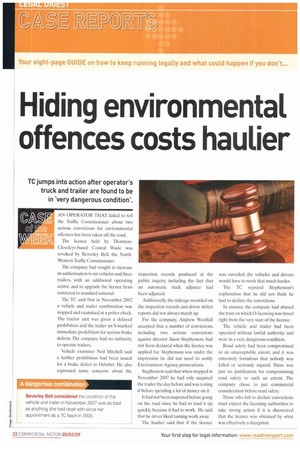Hiding environmental offences costs haulier
Page 22

If you've noticed an error in this article please click here to report it so we can fix it.
IC jumps into action after operator's truck and trailer are found to be in 'very dangerous condition'.
AN OPERATOR THAT failed to tell the Traffic Commissioner about two serious convictions for environmental offences has been taken off the road.
The licence held by ThorntonCleveleys-based Coastal Waste was revoked by Beverley Bell, the NorthWestern Traffic Commissioner.
The company had sought to increase its authorisation to six vehicles and three trailers, with an additional operating centre, and to upgrade the licence from restricted to standard national.
The TC said that in November 2007, a vehicle and trailer combination was stopped and examined at a police check. The tractor unit was given a delayed prohibition and the trailer an S-marked immediate prohibition for serious brake defects. The company had no authority to operate trailers.
Vehicle examiner Neil Mitchell said a further prohibition had been issued for a brake defect in October. He also expressed some concerns about the inspection records produced at the public inquiry, including the fact that an automatic slack adjuster had been adjusted.
Additionally, the mileage recorded on the inspection records and driver defect reports did not always match up.
For the company, Andrew Woolfall accepted that a number of convictions, including two serious convictions against director Jason Stephenson, had not been declared when the licence was applied for. Stephenson was under the impression he did not need to notify Environment Agency prosecutions.
Stephenson said that when stopped in November 2007 he had only acquired the trailer the day before and was testing it before spending a lot of money on it.
It had not been inspected before going on the road since he had to load it up quickly because it had to work. He said that he never liked turning work away.
The haulier said that if the licence was curtailed, the vehicles and drivers would have to work that much harder.
The IC rejected Stephenson's explanation that he did not think he had to declare the convictions.
In essence, the company had abused the trust on which 0-licensing was based right from the very start of the licence.
The vehicle and trailer had been operated without lawful authority and were in a very dangerous condition.
Road safety had been compromised to an unacceptable extent, and it was extremely fortuitous that nobody was killed or seriously injured. There was just no justification for compromising road safety to such an extent. The company chose to put commercial consideration before road safety.
Those who fail to declare convictions must expect the licensing authorities to take strong action if it is discovered that the licence was obtained by what was effectively a deception.
















































































































































